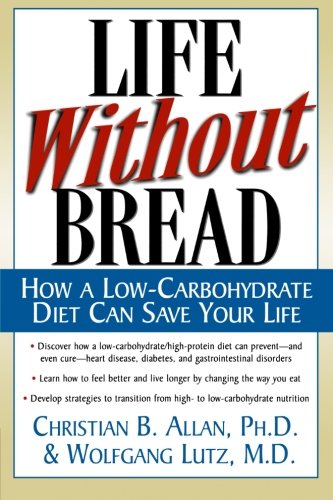Recently by Mark Sisson: 10 Ways to “Get Primal”
Clearly, we eat not just to fill our stomachs but to satisfy a whole host of biochemical drives. The brain is built to incentivize our efforts not just with the quieting of hunger pangs but the kick-starting of an intricate hormonal “reward” system. When it comes to diet, I’ve always said what nurtures the body nurtures the brain. The proof is in the biochemical picture. And while I wholeheartedly believe that we each choose what we eat and how we treat our bodies, there’s something to the science that shows addictive properties in junk food. I occasionally get emails on this topic. Here’s a timely one from last week.
 Life Without Bread: Ho...
Best Price: $1.68
Buy New $6.58
(as of 10:46 UTC - Details)
Life Without Bread: Ho...
Best Price: $1.68
Buy New $6.58
(as of 10:46 UTC - Details)
Dear Mark,
I’m wondering if you believe in junk food addiction. I’m very new to the Primal Blueprint diet and have been having some serious issues. I feel like it’s one step forward two steps back some days. For instance, I fell off the wagon entirely at Halloween, thinking a few pieces from my kids’ stash wouldn’t be a big deal for a couple days. But a few pieces turned into a whole backslide. I found myself roaming the house for days afterward craving foods I thought I was done with. I’m finally getting back on track now, but I’ll admit I’m a little stunned. I don’t want to make excuses for myself (no one made me eat the stuff to begin with), but is there something more complicated here than I think?
 The Primal Blueprint C...
Best Price: $1.23
Buy New $9.20
(as of 12:45 UTC - Details)
The Primal Blueprint C...
Best Price: $1.23
Buy New $9.20
(as of 12:45 UTC - Details)
I know there are those in this community who consider themselves recovering sugar addicts, so to speak. Some regularly offer their comments on the boards/forum threads, and others have written me personally about the difficulty of breaking through this first “wall” on the way to going Primal. When you’re addicted to sugar (or carbs in general), even a day’s break can make you feel like a rabid fiend scouring for your next fix. Cutting all grains in addition to sugar (since grains readily convert to glucose) will be critical for your success in this case. In fact, you probably can’t eliminate a long-term sweet-toothed sugar craving without eliminating grains.
An interesting study presented at the Society for Neuroscience conference last month gets closer to the biochemical reason for this. As researchers observed rats that were fed a steady diet of “junk food,” (chocolate, cheesecake, bacon, sausage, etc.) they found that the “’animals’ brain reward circuits became less responsive’” over time. Not surprisingly, the animals began to exhibit “compulsive overeating habits.” Even when subjected to mild shocks, the animals were undeterred as they chowed down on the junk food, and they refused to eat healthier food when it was the only feed available. In essence, the junk food dulled their pleasure centers. As a result, they kept seeking out the junk food and eating in an attempt to trip the reward trigger, but the blunted neurological response was never enough. This diminishing of pleasure center response, the researchers added (PDF), paralleled what they have witnessed in rats “’as they become addicted to cocaine or heroin.’” (Comforting, eh?)
Other studies have shown similar findings. Using human brain imaging, researchers have found lower dopamine (linked to reward and pleasure response) receptor levels in obese people compared to subjects in their recommended weight range.





